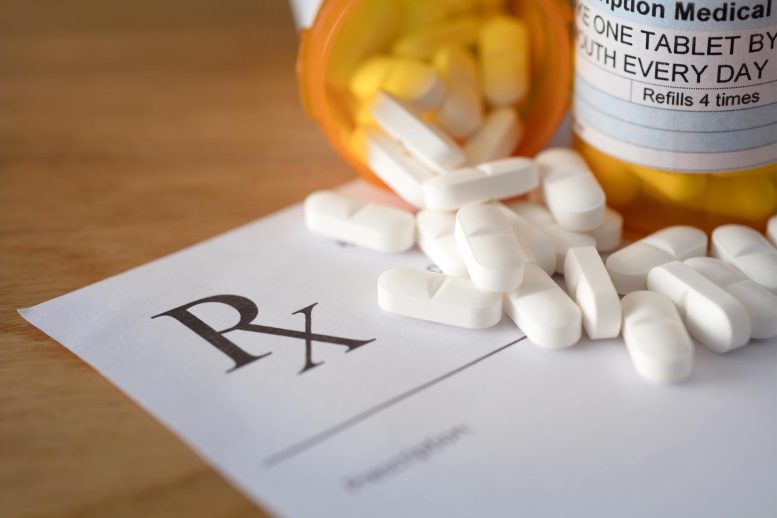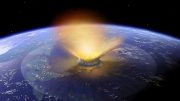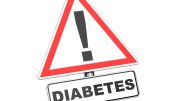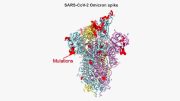
Researchers found that the elevated hazard of death from any cause associated with severe inflammation was lowered by 51% if the patient was prescribed anti-inflammatory steroids after their hospitalization.
Prescription of steroids upon discharge from hospital for COVID-19 should become standard, argue authors.
Evidence is growing that ‘long Covid’, that is, continued negative health impacts months after apparent recovery from severe Covid-19, is an important risk for some patients. For example, researchers from the University of Florida Gainesville showed last December that hospitalized patients who seemingly recovered from severe COVID-19 have more than double the risk of dying within the next year, compared to people who experienced only mild or moderate symptoms and who had not been hospitalized, or who never caught the illness.
“Here we show that the stronger the inflammation during the initial hospitalization, the greater the probability that the patient will die within 12 months after seemingly ‘recovering’ from COVID-19.” — Prof Arch G Mainous III
Now, a team of researchers including some of the same authors shows, for the first time, that among patients hospitalized for COVID-19 who seemingly recovered, severe systemic inflammation during their hospitalization is a risk factor for death within one year. This may seem paradoxical, as inflammation is a natural part of the body’s immunological response, which has evolved to fight infection. However in some illnesses, including COVID-19, this response may overshoot, causing further harm.
“COVID-19 is known to create inflammation, particularly during the first, acute episode. Our study is the first to examine the relationship between inflammation during hospitalization for COVID-19 and mortality after the patient has ‘recovered’,” said first author Prof Arch G Mainous III, vice chair for research in the Department of Community Health and Family Medicine at the University of Florida Gainesville.
“Here we show that the stronger the inflammation during the initial hospitalization, the greater the probability that the patient will die within 12 months after seemingly ‘recovering’ from COVID-19.”
Mainous and colleagues studied the de-identified electronic health records of 1,207 adults hospitalized in 2020 or 2021 after testing positive for COVID-19 within the University of Florida health system, and who had been followed up for at least one year after discharge. As a proxy for the severity of systemic inflammation during hospitalization, they used a common and validated measure, the concentration in blood of the molecule C-reactive protein (CRP), secreted by the liver in response to a signal by active immune cells.
Inflammation in many parts of the body
As expected, the blood concentration of CRP during hospitalization was strongly correlated with the severity of COVID-19: 59.4 mg/L for hospitalized patients who didn’t require supplemental oxygen, 126.9 mg/L for those who needed extra oxygen through non-invasive, non-mechanical ventilation, and 201.2 mg/L for the most severe cases, who required ventilation through a ventilator or through extracorporeal membrane oxygenation.
COVID-19 patients with the highest CRP concentration measured during their hospital stay had a 61% greater hazard – corrected for other risk factors – of dying of any cause within one year of discharge from the hospital than patients with the lowest CRP concentration. These results were published on May 12, 2022, in the journal Frontiers in Medicine.
Mainous said: “Many infectious diseases are accompanied by an increase in inflammation. Most times the inflammation is focused or specific to where the infection is. COVID-19 is different because it creates inflammation in many places besides the airways, for example in the heart, brain, and kidneys. High degrees of inflammation can lead to tissue damage.”
Importantly, the authors showed that the elevated hazard of death from any cause associated with severe inflammation was lowered again by 51% if the patient was prescribed anti-inflammatory steroids after their hospitalization.
These results mean that the severity of inflammation during hospitalization for COVID-19 can predict the risk of subsequent serious health problems, including death, from ‘long Covid’. They also imply that current recommendations for best practice may need to be changed, to include more widespread prescription of orally taken steroids to COVID-19 patients upon their discharge.
COVID-19: a chronic disease?
COVID-19 should be seen as a potentially chronic disease, propose the authors.
“When someone has a cold or even pneumonia, we usually think of the illness being over once the patient recovers. This is different from a chronic disease, like congestive heart failure or diabetes, which continue to affect patients after an acute episode. We may similarly need to start thinking of COVID-19 as having ongoing effects in many parts of the body after patients have recovered from the initial episode,” said Mainous.
“Once we recognize the importance of ‘long Covid’ after seeming ‘recovery’, we need to focus on treatments to prevent later problems, such as strokes, brain dysfunction, and especially premature death.”
Reference: “The Impact of Initial COVID-19 Episode Inflammation Among Adults on Mortality Within 12 Months Post-hospital Discharge” by Arch G. Mainous III, Benjamin J. Rooks and Frank A. Orlando, 12 May 2022, Frontiers in Medicine.
DOI: 10.3389/fmed.2022.891375









Be the first to comment on "Steroids After COVID-19 Recovery May Cut “Long COVID” Risk of Death by Up to 51%"